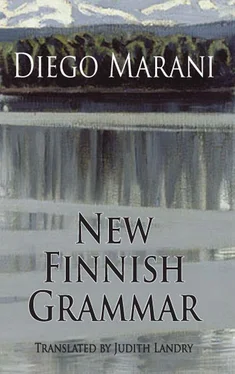‘They’re looking for people to help with the bonfires. Tonight’s the night.’ I was the only person in the room, lying stretched out on my bed and staring at the ceiling, but the pastor had come into the visitors’ quarters on tiptoe and had spoken in an undertone.
‘The bonfires?’ I asked.
‘The army’s putting great piles of wood together to the north of the city. Tonight, when the Russian bombers come, our men will set fire to them. It’s a trick: they’ll think they’re seeing Helsinki going up in flames, and that’s where they’ll drop their bombs!’ he explained, taking my jacket off the nail and throwing it towards me.
We piled into the lorries, which then drove off, lights dimmed, towards the forest further inland, along a track of frozen snow. It was pitch black; the snow gave off no reflection, and the dark sky loomed above us. Suddenly we stopped, deep in the woods; the whole column waited in silence, scanning the sky. I couldn’t see hair or hide of the pastor, but I sensed that he was near me; I recognized the unmistakable smell of his overcoat, which smelt of musty paper, as did the sacristy. We carried on walking until we came to a large clearing, where groups of men were already at work around large heaps of cut-down trees; there were also several tractors, and dray-horses. The lorries drew up in a circle; we clambered out and formed a line, to be handed axes and saws. Then we were divided into teams, and each was given a task. I worked for hours in silence, unable to make out the faces of my companions. I recognized them by their movements, by the way they walked across the snow. The pastor was wearing a cap with the earflaps unfastened, so that they swung around with his every movement, making him look like one of the magicians from the Kalevala that he would show me from his illustrated version. Our team’s task was to drag the trunks into the clearing after they had been cut down and roughly trimmed by other soldiers in the forest. We would saw them up into bits, then another team would come to collect them and pile them up. The exhaustion, the sweat, that whole clearing swirling with the men’s white breath, those bodies working in silence, all gave me a sense of peace, of harmony. I was no longer alone, no longer an outsider. I was among my own people; I was working with them to protect our land. It was a powerful feeling; it lent strength to my right arm as I drew on the great toothed blade which bit so effortlessly into the flesh of the wood, as though it too was eager to bolster that surge of concerted energy. The pastor must have noticed, because he came up behind me and slapped me on the shoulder. The earflaps swung around, and I could imagine the expression on his face, although I couldn’t see it. A whistle halted us in our tracks; the tractors turned off their engines and we all ran into the woods, then waited in silence. Shortly afterwards we heard a rumble, followed by several explosions: they were bombing Helsinki. Orders were barked out; a tanker emerged from the woods and began to douse the piles of wood with naphtha; the lorries formed into columns, in preparation for departure. I followed Koskela’s earflaps, then found myself seated next to him, puffing and sweating. No one said a word; the only sound was my companions’ laboured breathing. The column started up. Before we turned into the woods, a gigantic burst of flame lit up the whole clearing, then bounded skywards. Suddenly the faces of my companions leapt out of the darkness, each with its own fear, its own amazement.
We did not make for Helsinki, but headed north-west. After some time the whole column drew up on a road in the woods, and waited; a sergeant handed out cigarettes, and passed round a bottle of koskenkorva . Most of the soldiers had climbed out of the lorries and were listening to the sound of the bombs, trying to work out where they were falling. Then suddenly we heard the sound of an approaching rumble, increasingly clear, and loud. The Russian planes were right above our heads, we could almost hear the throb of the pistons, the metallic whirr of the propellers. The ground was shaken by several powerful explosions; the soldiers were becoming uneasy, some were running along the column looking for officers. Then the rumour spread.
‘It’s working!’ someone shouted.
‘Hurray!’ we all shouted back.
Then the sound of singing rang out through the dark woods: voices previously held in check were now set free to rise upwards, soft and buoyant. It was as though all Finland were singing, as though the same song, delicate as glass, was rising from each woods, each lake, each far-flung house of that vast land. Restrained and gentle as it was, it seemed ill-suited to that night of war; and yet, ever more solid, ever more convinced, it flooded every last corner of the forest, leaving no place or heart untouched. Behind us the sky was aflame, the Russian bombers were flying above our heads but did not see us, and we, bareheaded now, beneath them in the woods, were singing: ever more loudly, louder than the planes, louder than the roar of the lorries as they moved off again, and our voices rose to a shout, our song became a battle cry. Now the rattle of bombs was all but drowned out by the sound of a marching song, its rhythm marked by the stamp of our heavy boots upon the ground. We were no longer afraid of being taken by surprise, indeed we wanted them to hear us, we wanted to fling those words of strength and outrage in their faces. I didn’t know them well, but I managed to grasp the drift of those songs and imitate their sounds; I opened my mouth as though to drink in the music which was pouring down on me, fully to share the magic of that rhythm. The tune throbbed around me as though it were in my very veins, and even the distant flames seemed to move to its racked dance.
It was dawn by the time we were back in the city. We knew that Kotka had taken a bad hit, but Helsinki had been left relatively unscathed. There were a few hours until the morning service, but both Koskela and I were too excited to think of sleep; instead, we retired to the sacristy and allowed ourselves the luxury of burning a few large logs, and making tea. The room was filled with the fragrant scent of woodsmoke.
‘Fire! Iron and fire! These are the only things that count in war! You whose name is Sampo — did you know that you are born of fire? Sampo is a sacred word for the Finns; the whole of the Kalevala revolves around it. No one can say exactly what it was, no one has ever seen it, because it has been destroyed. It might have been the pillar which held up the earth, and whose collapse for ever cut us off from the place we came from. Legend has it that the Sampo has three lids, which are made from the tip of a swan’s wing, the milk from a barren cow and the seed from a head of barley. It could have been made only by Ilmarinen, the smith god who had already forged the ‘lid of heaven’, together with the planets and the stars. The queen of Pohjola had promised her daughter in marriage to the runoilija (poet) Väinämöinen, if he procured the Sampo for her. He gave the offer close consideration: the queen of Pohjola was the powerful ruler of the land of ice, and her people had tried to invade the fertile plains of Kaleva on more than one occasion; marriage with the daughter of his longstanding rival would at last bring peace to the two peoples. Furthermore, a young princess would give new life to his old blood, sapped by the passing of the years. The great runoilija wanted to ensure a radiant future for his people; for their sake he was even willing to forego the Sampo . So Väinämöinen instructed Ilmarinen to go to the kingdom of Pohjola, to render this great service to the queen of the land of ice. The faithful Ilmarinen obeys the orders of his lord. Arriving at the court of Pohjola he promptly sets to work, and on the first day the breath of his bellows coaxes into life a golden arch with a silver apex. it was most beautiful, it was prodigious, but it was not what he wanted, and the smith casts it back into the fire. The next day what he produces is a boat, completely red but with a golden stern and copper rowlocks, and clearly this is not the Sampo either. The smith persists: after drawing a golden-horned heifer from his forge, its forehead strewn with stars and the disc of the sun upon its head, and a plough with a golden ploughshare, a copper shaft and a silver tip, at last, on the fourth day, it is truly the Sampo that emerges from the flames. Ilmarinen is exultant: he places three mills beside it, one for making flour, one salt, and one gold. The magical Sampo , which will give men light, has been created. As a reward, the queen of Pohjola will offer her splendid daughter in marriage not to Väinämöinen, but to Ilmarinen. For this powerful ruler had already understood that Väinämöinen was a man of the past, from the time when the world was made of water and men were fish. The future lay in iron, and in the fire which melted it, turning it into the magical Sampo !’
Читать дальше












